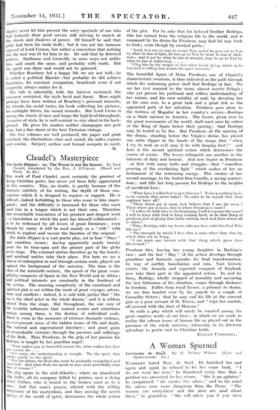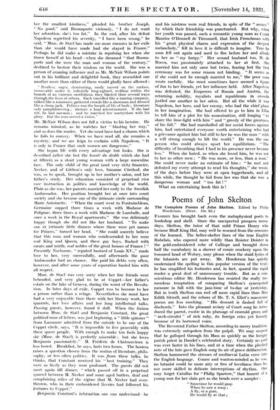A Woman Spurned
NAPOLEON hated Mme. de Stael. He banished her and again and again he refused to let her come back. " I do not want her here," he thundered every time that a petition was presented for her return. "She is an agitator," he complained, " she excites the salons," and to his mind the salons were more dangerous than the Press. " The women are everywhere and the men are mad about them," he grumbled. " She will adore you if you show
her the smallest kindness," pleaded his brother Joseph. " No good," said Buonaparte viciously, " I do not want her adoration, she's too fat." In the end, after his defeat Napoleon regretted his severity, " I have been wrong," he said, " Mine. de Staid has made me more enemies in her exile than she would have made had she stayed in France." Perhaps he did make a mistake in repulsing her when she threw herself at his head—when she dreamed " that Buona- parte and she were the man and woman of the century," destined to bestow their wisdom on the world. She was a person of amazing influence and as Mr. McNair Wilson points out in his brilliant and delightful book, they resembled one another more than either of them would gladly have allowed :
" Restless, eager, dominating, easily moved on the surface, immovable under it, infinitely long-sighted, reckless within the bounds of an extreme carefulness, they blasted their several ways through the lives of others. Each travelled like a touring company, talked like a missioner, gathered crowds like a showman and dressed like a cheap-jack. Politics was the breath of life of both ; literature 'only pamphleteering ; rhetoric a loud advertisement. If she had wit, he had sarcasm ; and he matched her martyrdom with his glory. But the man served a vision."
Mr. McNair Wilson does not fall a victim to his heroine. He remains inimical, as he watches her " blasting her way,"
and so does the reader. Yet she must have had a charm which he fails to convey. When we have read all, she remains a mystery, and we are feign to exclaim with Napoleon, " It is only in France that such women are dangerous."
She began life with every advantage but looks. She is described (after she lost the beaute du djable which she had at fifteen) as a stout young woman with a large masculine face. The only child of the great (and very rich) financier, Necker, and of Gibbon's only love, Suzanne Ciirchod, she was, so to speak, brought up in her mother's salon, and her father's study. Her education consisted of perpetual viva twee instruction in politics and knowledge of the world. Plain as she was, her parents married her early to the Swedish Ambassador. Her position brought her at once into court society and she became one of the intimate circle surrounding Marie Antoinette. " When the court went to Fontainebleau, Germaine supped three times a week with Madame de Polignac, three times a week with Madame de Lamballe, and once a week in the Royal apartments." She was deliriously
happy though she did not like her husband. " To make one at. intimate little dinners where there were pet names
for Princes," turned her head. " She could scarcely believe that this man and woman who condescended to her were real King and Queen, and these gay boys, flushed with meats and mirth, real nobles of the great houses of France ! " Presently Narbonne, " reputed bastard of Louis XV.," made love to her, very successfully, and afterwards the poor Ambassador had no chance. She paid his debts very often, however, and after some years of separation buried him with all respect.
Mine. de Stael was very sorry when her fine friends were beheaded, and very glad to be at Coppet—her father's estate on the lake of Geneva, during the worst of the Revolu- tion. In later days of exile, Coppet was to become to her a prison rather than a refuge. Nevertheless she must have had a very enjoyable time there with her literary work, her quarrels, her love affairs and her long intellectual talks.
Passing guests, however, found it dull. When the liaison between Mme. de Stael and Benjamin Constant, the great political man of letters, was just beginning, a " little spinster " front Lausanne admitted from the outside to be one of the Coppet circle, says, "It is impossible to live peaceably with these queer people. With enough to make ten fools happy she (Mine. de Stael) is perfectly miserable ; but she loves Benjamin passionately.", . M. Frederic de Chateauvieux is
less bored. Breakfast, he says, lasts two hours. The hostess raises a question chosen from the realms of literature, philo-
sophy, or less often politics. It was ',from .these talks, he thinks, that Constant received his " best training." They were as lively as they were profound. The guests" did not
meet. again till dinner, " which passed off in a perpetual
quarrel between M. Necker and' some aged butlers, 'deaf and complaining relics of the regime that M. Necker had over- thrown, WIM in their embMidered liVerieS had . folloWed his fortunes to . Coppet." Benjamin Constant'S infatuation one 'can iinderitand—he
and his mistress were real friends, in spite of the " scenes" by which their friendship was punctuated. But why, when her youth was passed, such a romantic young man as Count Maurice O'Donnell de Tirconnell, that Irish Frenchman with his " great physical charm_ and expression of the deepest melancholy," fell in love it is difficult to imagine. True he soon fell out again and used to flee before her and allude to her as " my harpy." Her second husband too, M. de Rocca, was passionately attached to her at first. She married him not only once but twice, fearing lest the first ceremony was for some reason not binding. " It seems as if she could not be enough married to me," the poor man wrote ruefully. She must sometimes have seemed a figure of fun to her friends, yet her influence held. After Napoleon was defeated, the Emperors of Russia and Austria, the returning nobility, royalists and republicans in crowds jostled one another in her salon. But all the while it was Napoleon, her hero, and her enemy, who had the chief place in her imagination. She had offered to go to him in Elba to tell him of a plot for his assassination, still longing to share the lime-light with him " and " greedy of the greatness of his fall." She had marshalled all her social forces against him, had entertained everyone worth entertaining who had a grievance against him but still to her he was the man " with a will strong enough to lift the world." He was the one person who could always upset her equilibrium. " The difficulty of breathing that I had in his presence never became less." When she hated, as when she loved him, he was not to her as other men ; " He was more, or less, than a man." She could never make an estimate of him : " he met and defeated my every attempt to read his thoughts," she wrote, of the days before they were at open loggerheads, and all this while, the thought he hid from her was that she was a dangerous woman and " too fat ! "
What an entertaining book this is !



































 Previous page
Previous page